In the ever-expanding field of cognitive enhancement and brain health, few compounds have garnered as much attention as choline. With its profound implications in memory, learning, and neurological development, choline has emerged as a cornerstone nutrient in both nootropic science and traditional nutrition. Its role extends beyond mere dietary support, influencing biochemical processes that lie at the heart of human cognition. This article delves into the intricate mechanisms by which choline supports brain function, exploring its chemical formula, amino acid origins, and its identity as a precursor for several indispensable pathways.
You may also like: Citicoline vs Alpha GPC: Which Choline Source Offers the Greatest Cognitive Support?
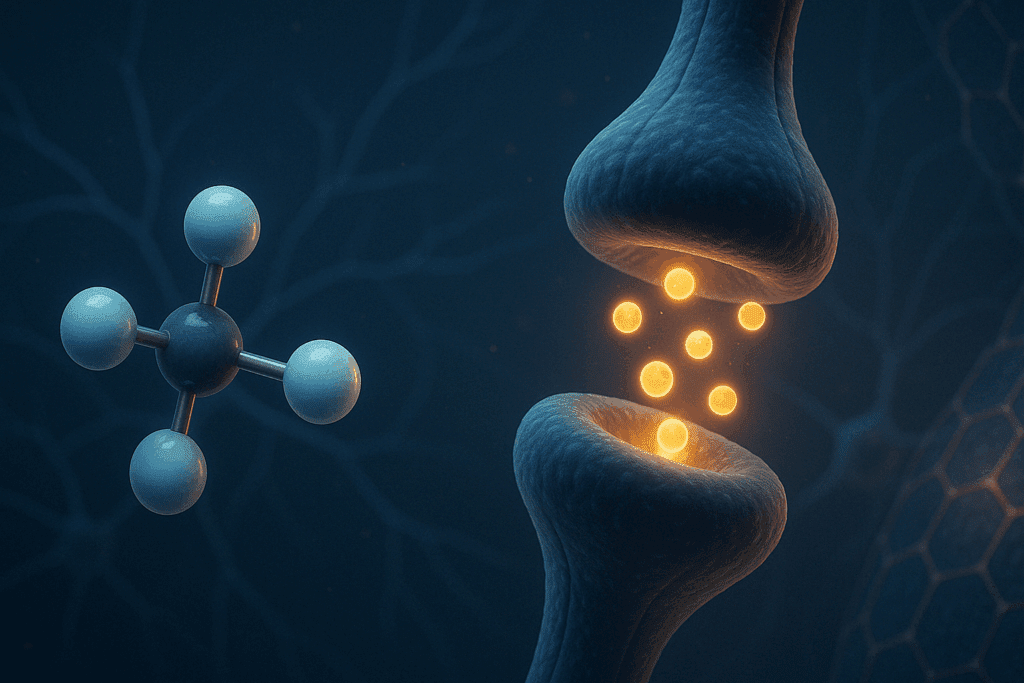
Understanding Choline and Its Essential Role in the Brain
Choline is a water-soluble nutrient often grouped with the B-complex vitamins, though it functions somewhat differently. Its chemical formula, C5H14NO, reveals a simple molecular structure with vast biological potential. The choline formula underscores its fundamental nature: a small compound with a potent impact. Once ingested, choline participates in a variety of physiological processes that are crucial to maintaining cellular membrane integrity, neurotransmitter synthesis, and methylation cycles.
One of the primary cognitive functions of choline is its conversion into acetylcholine, a neurotransmitter deeply involved in memory formation and synaptic plasticity. Without sufficient choline, acetylcholine synthesis diminishes, resulting in decreased neural efficiency and potential memory impairment. This connection between choline and memory is not merely theoretical—it has been substantiated by numerous clinical studies, particularly those examining neurodegenerative conditions such as Alzheimer’s disease.
Moreover, choline contributes to the structural integrity of cell membranes through its involvement in the synthesis of phosphatidylcholine and sphingomyelin. These phospholipids are essential components of neuronal membranes, supporting signal transmission and protecting against oxidative stress. In this way, the choline formula is intricately woven into the architecture of the brain, reinforcing both its chemical and structural framework.
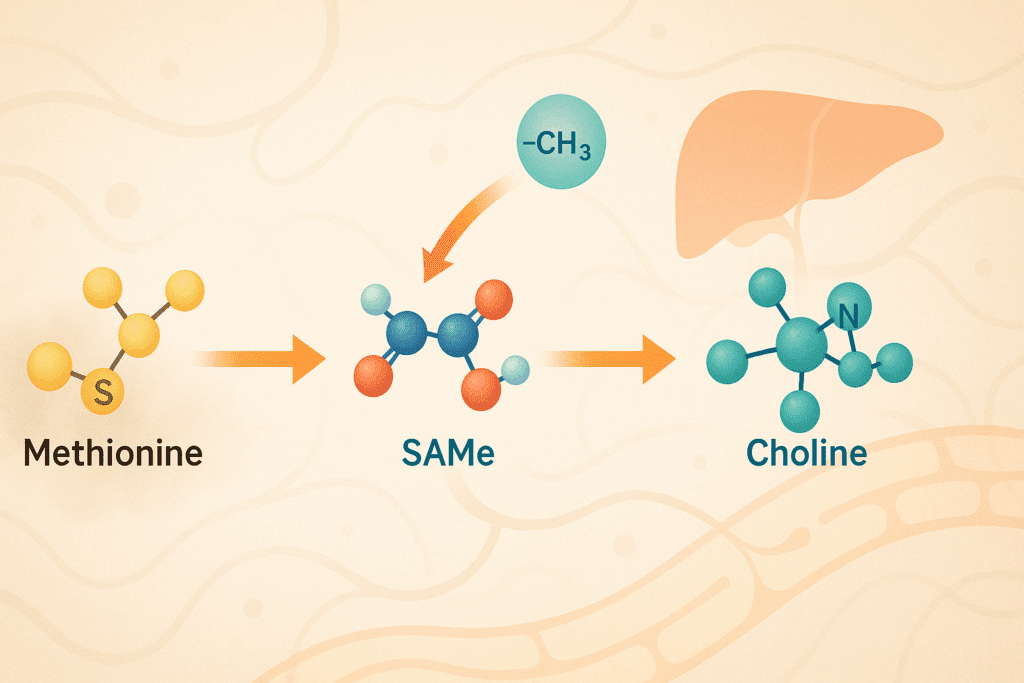
From Which Amino Acid Can Choline Be Made?
Choline can be synthesized in small amounts in the liver via the methylation of phosphatidylethanolamine, a reaction catalyzed by phosphatidylethanolamine N-methyltransferase (PEMT). This reaction relies on S-adenosylmethionine (SAMe) as a methyl donor. However, to fully grasp the biochemical roots of choline, one must examine the amino acid methionine, from which methyl groups are derived. Thus, when asking from which amino acid can choline be made, methionine emerges as the central player.
Methionine is an essential amino acid, meaning it must be obtained through the diet. It serves not only as a building block for protein synthesis but also as a precursor for SAMe, the universal methyl donor. SAMe plays a critical role in the methylation of DNA, proteins, and lipids—a process that governs gene expression and neural health. Through its role in supporting SAMe production, methionine indirectly facilitates the endogenous synthesis of choline. This biochemical relationship demonstrates how deeply intertwined amino acid metabolism is with cognitive functionality.
However, the human body’s ability to produce choline de novo is limited, and dietary intake remains essential. Even though choline can be made from methionine under certain conditions, this pathway is not sufficient to meet all physiological demands, especially in stages of life where cognitive development is most rapid, such as during infancy or pregnancy. Consequently, understanding from which amino acid choline can be made is only part of the picture; appreciating the limitations of this synthesis underscores the importance of dietary choline.
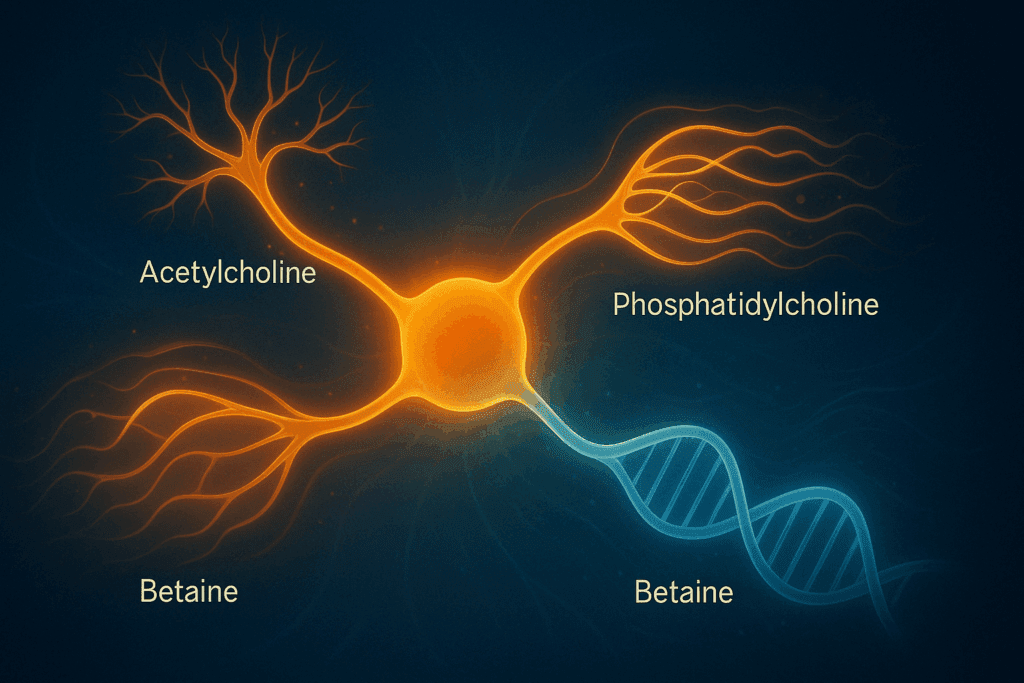
Choline as a Precursor for Several Vital Biochemical Pathways
Beyond its role in neurotransmitter production, choline is a precursor for several pathways that sustain human life at the molecular level. Among these, the most prominent are acetylcholine biosynthesis, phospholipid synthesis, and one-carbon metabolism. Each of these pathways contributes uniquely to cognitive and systemic health, and all hinge on the availability of sufficient choline.
In the realm of neurotransmission, the synthesis of acetylcholine is perhaps the most well-known function of choline. Acetylcholine is not only essential for memory and learning but also regulates attention, arousal, and muscle activation. Choline’s role in this context is immediate and direct: it combines with acetyl-CoA via the enzyme choline acetyltransferase to form acetylcholine. This reaction occurs predominantly in cholinergic neurons, which rely heavily on dietary choline to maintain neurotransmitter stores.
In addition to its neurological roles, choline is essential in maintaining the structural and functional integrity of cellular membranes. Through its conversion into phosphatidylcholine, choline supports membrane fluidity, signal transduction, and lipid metabolism. Phosphatidylcholine also plays a role in the formation of very low-density lipoproteins (VLDL), which are necessary for the transport of fat from the liver. A deficiency in choline can result in hepatic steatosis, or fatty liver, due to impaired VLDL secretion.
Choline’s involvement in one-carbon metabolism, specifically the methylation cycle, further illustrates its biochemical versatility. In this pathway, choline is oxidized to betaine, which then donates methyl groups to homocysteine, converting it back into methionine. This process not only sustains the methionine cycle but also mitigates homocysteine accumulation, which has been associated with cardiovascular and cognitive decline. Therefore, when discussing why choline is a precursor for several pathways, its role in methyl group donation emerges as a cornerstone of metabolic and cognitive health.
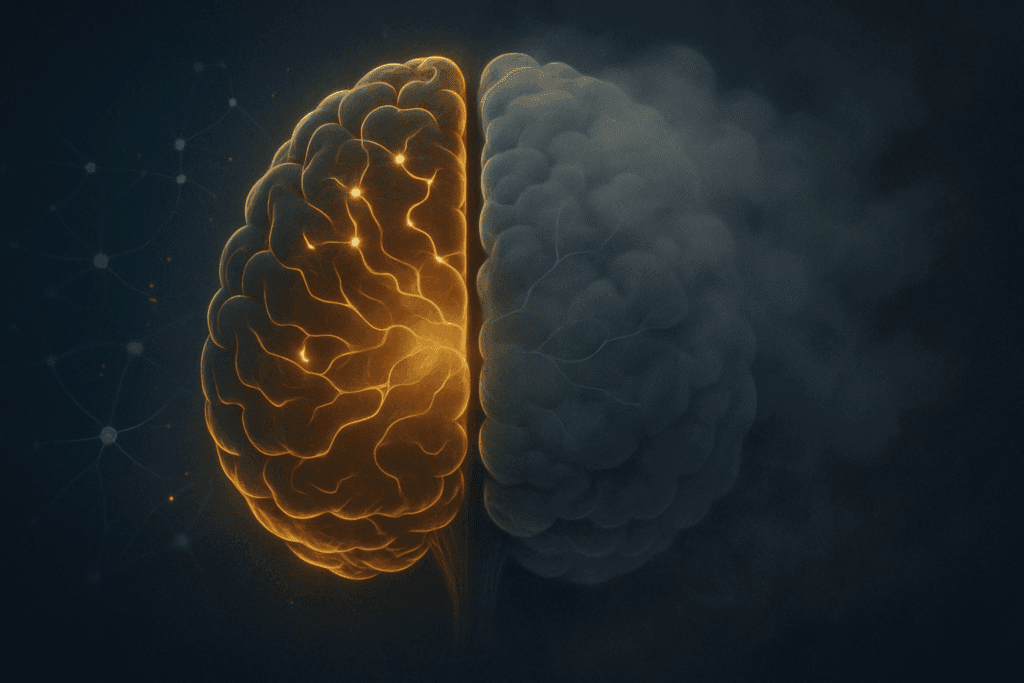
The Impact of Choline Deficiency on Cognitive Function and Brain Fog
Brain fog, a term often used to describe a state of mental fatigue, forgetfulness, and lack of focus, is frequently linked to nutritional imbalances. Among the many nutrients implicated in brain fog, choline holds a prominent place. Because choline is a precursor for several crucial neurotransmitters and membrane components, its deficiency can disrupt neuronal communication and membrane signaling, both of which are essential for mental clarity.
The symptoms of choline deficiency extend beyond mere forgetfulness. Individuals with low choline intake often report difficulty concentrating, slowed processing speed, and reduced mental stamina. These cognitive symptoms are particularly noticeable under stress or during periods of high mental demand. Studies have shown that even short-term choline deprivation can impair memory and attention, underlining the nutrient’s immediate relevance to cognitive performance.
Moreover, choline deficiency has been associated with structural brain changes, especially in older adults. Imaging studies suggest that inadequate choline intake may accelerate brain atrophy, a condition linked with age-related cognitive decline and neurodegeneration. This is particularly concerning given the widespread prevalence of low dietary choline intake, especially among populations that exclude choline-rich foods such as eggs and liver from their diets.
In younger populations, including students and working professionals, suboptimal choline levels can manifest as reduced focus, learning difficulties, and general mental sluggishness. In these cases, dietary intervention or choline supplementation may help alleviate symptoms of brain fog by restoring optimal acetylcholine levels and enhancing membrane fluidity in neuronal cells. Thus, choline is not merely a supportive nutrient; it is a foundational element of cognitive health.
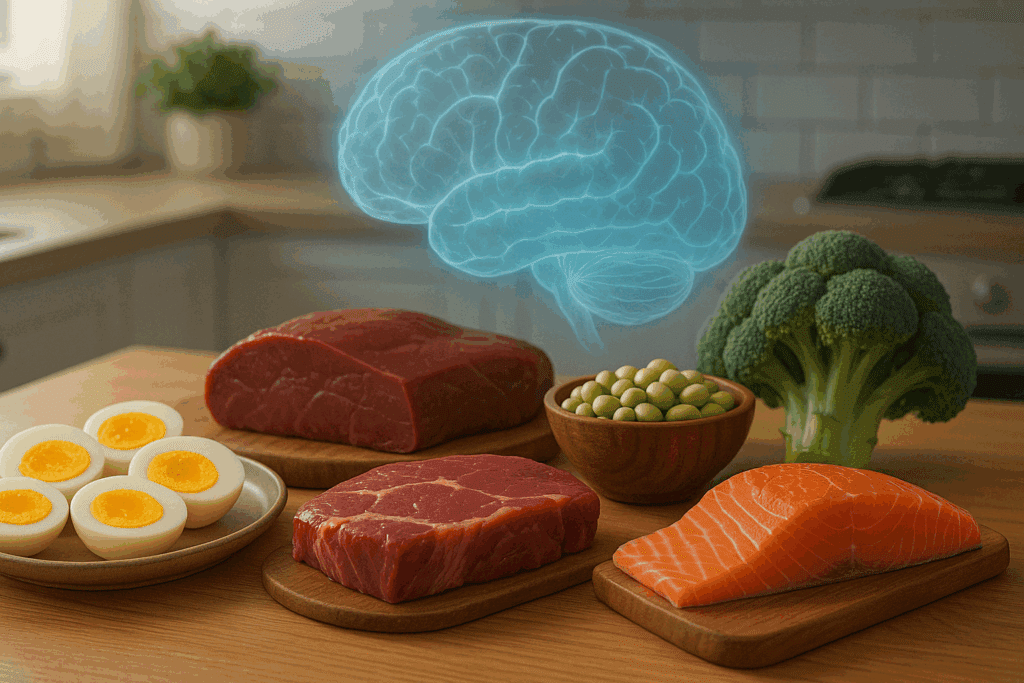
Optimizing Choline Intake: Dietary Sources and Supplementation
Meeting the body’s choline requirements through diet is both feasible and essential. Natural sources of choline include eggs, particularly the yolks, which are among the richest dietary sources. Other choline-dense foods include liver, beef, poultry, fish, and dairy products. Plant-based options such as soybeans, quinoa, and cruciferous vegetables also contribute to choline intake, though in smaller amounts.
Despite the availability of choline in a variety of foods, research indicates that most individuals do not meet the recommended adequate intake (AI) levels. This gap is particularly significant in pregnant women, where choline demands increase substantially due to the nutrient’s role in fetal brain development and neural tube closure. Supplementation with choline, in the form of alpha-GPC, CDP-choline (citicoline), or phosphatidylcholine, can be an effective strategy to bridge this gap, especially in populations with elevated cognitive demands or restricted diets.
Alpha-GPC and CDP-choline are both notable for their high bioavailability and ability to cross the blood-brain barrier efficiently. These forms of choline supplementation have been shown to improve memory, attention, and mental clarity in both healthy individuals and those with cognitive impairment. Furthermore, they act quickly, often producing noticeable benefits within days to weeks of consistent use.
When selecting a choline supplement, it is important to consider both form and dosage. Clinical studies typically use doses ranging from 250 to 1,200 mg per day, depending on the individual’s needs and baseline choline levels. As always, consulting a healthcare provider before beginning any supplementation protocol is advisable, particularly for individuals with pre-existing conditions or those taking medications that may interact with choline metabolism.

Choline and Long-Term Cognitive Health: A Lifespan Perspective
The benefits of choline extend across the human lifespan, from prenatal brain development to the preservation of cognitive function in aging. During pregnancy, choline plays a crucial role in fetal neurodevelopment, influencing brain structure and the expression of genes involved in neural signaling. Maternal choline intake has been linked with improved memory performance in offspring, suggesting that early-life nutrition exerts a lasting influence on cognitive outcomes.
In adulthood, choline continues to support neuroplasticity, the brain’s ability to reorganize itself in response to learning and experience. Adequate choline levels help maintain acetylcholine synthesis, which is vital for tasks involving memory recall and complex problem-solving. In high-performance environments such as academia, technology, and entrepreneurship, where sustained mental focus is required, choline supplementation may offer a competitive edge.
As individuals age, the risk of cognitive decline increases, and with it, the importance of nutrients that support brain resilience. Choline has been shown to reduce markers of neuroinflammation and oxidative stress, two processes implicated in neurodegenerative diseases like Alzheimer’s. Longitudinal studies have observed that higher choline intake correlates with slower rates of cognitive decline and better preservation of white matter integrity in the brain.
The use of choline in preventive health strategies is becoming increasingly popular, especially among those seeking to preserve mental sharpness into old age. By ensuring consistent choline intake through diet and supplementation, individuals can help safeguard their cognitive capacities well into the later decades of life. Choline, therefore, is not just a short-term cognitive enhancer but a lifelong ally in brain health.
Frequently Asked Questions About Choline and Cognitive Function
1. How does choline intake influence long-term memory resilience? Emerging research suggests that long-term choline intake, particularly when maintained consistently across decades, may offer protective benefits against age-related memory loss. While short-term choline supplementation often targets neurotransmitter support, long-term intake contributes more significantly to epigenetic stability, which governs gene expression patterns related to cognition. Choline is a precursor for several epigenetic regulatory pathways, including DNA methylation, which influences the expression of memory-related genes. Even modest dietary insufficiencies can impair methylation capacity, potentially altering memory resilience later in life. Interestingly, some longitudinal studies have begun investigating whether early-life choline exposure can modify neurological trajectories in ways that persist across generations.
2. Can choline supplementation affect emotional regulation or mood stability? Although choline is best known for supporting memory and focus, its influence on emotional regulation is increasingly recognized. The reason choline is a precursor for several neurochemical systems—including acetylcholine, phosphatidylcholine, and betaine—makes it highly relevant in mood modulation. Acetylcholine, for instance, is involved not only in cognition but also in regulating arousal and emotional responsiveness. Moreover, methylation activity tied to choline metabolism impacts serotonin and dopamine synthesis indirectly. Those experiencing mood swings or irritability linked to stress may benefit from ensuring adequate choline intake, especially if their diets are low in animal-based foods, which are prime choline sources.
3. Are there any overlooked signs that your choline levels may be suboptimal? Yes, beyond the well-known symptoms like memory lapses and brain fog, subtler signs of insufficient choline intake include increased irritability, poor sleep quality, and slower recovery from physical or mental exertion. Because choline is a precursor for several cellular maintenance processes, a deficiency may manifest systemically rather than just neurologically. Muscle fatigue, impaired liver function, or elevated homocysteine levels can also hint at choline imbalances. Tracking these broader symptoms can offer early insight into whether dietary adjustments or testing might be warranted. While these indicators are not exclusive to choline deficiency, they often improve noticeably once intake is corrected.
4. How does the choline formula support liver and metabolic health beyond brain function? The choline formula (C5H14NO) illustrates its role as a compact but powerful agent in lipid metabolism. Specifically, it enables the synthesis of phosphatidylcholine, which is critical for transporting fats from the liver. Without this function, fats can accumulate, contributing to nonalcoholic fatty liver disease. Moreover, since choline is a precursor for several lipid regulatory enzymes, it indirectly supports systemic lipid balance and healthy cholesterol levels. This metabolic support also helps maintain stable energy levels, as fat processing becomes more efficient. While the cognitive benefits of choline often receive top billing, its metabolic contributions are equally vital, especially for individuals with metabolic syndrome or insulin resistance.
5. From which amino acid can choline be made, and why is this important? Choline can be synthesized endogenously through a pathway involving the amino acid methionine. From which amino acid can choline be made becomes especially relevant when dietary intake is low and the body must rely on internal reserves. Methionine supports this process via its role in producing S-adenosylmethionine (SAMe), a universal methyl donor crucial for choline biosynthesis. However, relying on this conversion can deplete methyl groups needed for other essential functions, such as DNA repair and hormone regulation. Therefore, while the answer to “from which amino acid can choline be made” is methionine, it’s not an ideal substitute for direct dietary choline—especially in periods of high cognitive or physiological demand.
6. How might choline needs change with different cognitive or physical demands? Choline requirements are not static—they fluctuate based on age, stress levels, hormonal status, and cognitive exertion. Athletes, for instance, may require higher choline intake due to increased turnover in acetylcholine for neuromuscular signaling. Likewise, students, entrepreneurs, and others in high-stakes mental environments may benefit from increased choline to support sustained focus and memory consolidation. Because choline is a precursor for several adaptive physiological processes, its demand rises during any period of elevated metabolic or neurological activity. Women who are pregnant or lactating also experience significantly heightened choline needs due to fetal brain development and milk production. Customizing choline intake to align with life stage and stress load is a sophisticated approach to optimizing both mental and physical performance.
7. Is there a risk of taking too much choline through supplements? While choline is generally well-tolerated, excessive intake—especially through high-dose supplements—can cause side effects in some individuals. These may include a fishy body odor, sweating, gastrointestinal upset, or hypotension. More importantly, an overreliance on choline supplements without balancing other methyl donors like folate and B12 could disrupt methylation equilibrium. Since choline is a precursor for several methylation-dependent reactions, this imbalance may produce downstream effects in gene expression or neurotransmitter synthesis. Thus, supplementing with choline should be done thoughtfully, ideally under guidance from a healthcare provider who understands how the choline formula interacts within the broader nutritional matrix.
8. What are some innovative or underexplored food sources of choline? While eggs and liver are well-known choline powerhouses, other foods—especially those gaining popularity in functional nutrition—offer lesser-known sources. For example, krill oil, known for its phospholipid-rich content, provides choline in a highly bioavailable form. Certain fermented soy products, such as natto and tempeh, also deliver modest amounts of choline while supporting gut health. Additionally, seaweed and algae-based supplements are emerging as plant-based sources rich in phosphatidylcholine. These underexplored options cater to diverse dietary preferences while supporting the same foundational pathways where choline is a precursor for several biochemical reactions crucial to cognition and cellular health.
9. How does choline interact with other nutrients involved in cognitive health? Choline operates synergistically with several other nutrients that collectively support brain performance. For instance, it works alongside omega-3 fatty acids—especially DHA—to build robust neural membranes. It also collaborates with B vitamins like folate, B6, and B12 in one-carbon metabolism, an area where choline is a precursor for several methylation reactions. This interplay ensures homocysteine is recycled properly and neurological inflammation remains in check. Additionally, choline’s relationship with magnesium and zinc influences neurotransmitter regulation and sleep quality. A deficiency in one of these nutrients can impair the efficacy of choline and vice versa, making a holistic nutritional strategy essential for brain optimization.
10. What does current research suggest about choline’s role in future neurotherapeutics? Emerging evidence positions choline as a potential component in integrative approaches to treating neurodegenerative diseases and cognitive decline. Because choline is a precursor for several neuroprotective compounds, it is being studied for its role in preventing the progression of conditions like Alzheimer’s, Parkinson’s, and multiple sclerosis. Clinical trials are exploring how targeted choline supplementation may restore phosphatidylcholine levels in damaged neuronal membranes or enhance acetylcholine synthesis in underperforming synapses. Moreover, researchers are investigating gene-nutrient interactions that affect how individuals metabolize choline based on their genetic makeup, opening the door for personalized choline-based therapies. These developments highlight that while the choline formula may appear simple, its implications in neuroscience are increasingly profound and personalized.
Conclusion: Why Choline Is a Precursor for Several Vital Pathways and a Pillar of Cognitive Vitality
Understanding the profound influence of choline on human cognition reveals why this nutrient is essential, not optional. From its chemical identity expressed in the choline formula to its roots in amino acid metabolism—particularly the role of methionine—choline exemplifies how a single molecule can orchestrate a symphony of cognitive and metabolic functions. It is no exaggeration to state that choline is a precursor for several foundational pathways that shape our mental clarity, neurological development, and overall brain resilience.
Whether synthesized from methionine or consumed through dietary sources, choline’s contributions are manifold and irreplaceable. It supports the synthesis of acetylcholine for memory and learning, builds the structural lipids that form neuronal membranes, and participates in methylation cycles that regulate gene expression and detoxification. These diverse functions highlight choline as not only a nutrient but a biochemical linchpin of human health.
For those seeking to combat brain fog, enhance cognitive performance, or protect their brain as they age, choline deserves close attention. The research is clear, and the evidence is compelling: ensuring adequate choline intake is one of the most practical and scientifically grounded steps you can take to promote lifelong cognitive wellness. In a world where mental performance is increasingly prized, choline offers a natural, effective, and research-backed pathway to clearer thinking and sharper focus.
Was this article helpful? Don’t let it stop with you. Share it right now with someone who needs to see it—whether it’s a friend, a colleague, or your whole network. And if staying ahead on this topic matters to you, subscribe to this publication for the most up-to-date information. You’ll get the latest insights delivered straight to you—no searching, no missing out.
Further Reading:
Choline: The underappreciated nutrient that’s vital for our brains
Important Note: The information contained in this article is for general informational purposes only, and should not be construed as health or medical advice, nor is it intended to diagnose, prevent, treat, or cure any disease or health condition. Before embarking on any diet, fitness regimen, or program of nutritional supplementation, it is advisable to consult your healthcare professional in order to determine its safety and probable efficacy in terms of your individual state of health.
Regarding Nutritional Supplements Or Other Non-Prescription Health Products: If any nutritional supplements or other non-prescription health products are mentioned in the foregoing article, any claims or statements made about them have not been evaluated by the U.S. Food and Drug Administration, and such nutritional supplements or other health products are not intended to diagnose, treat, cure, or prevent any disease.


